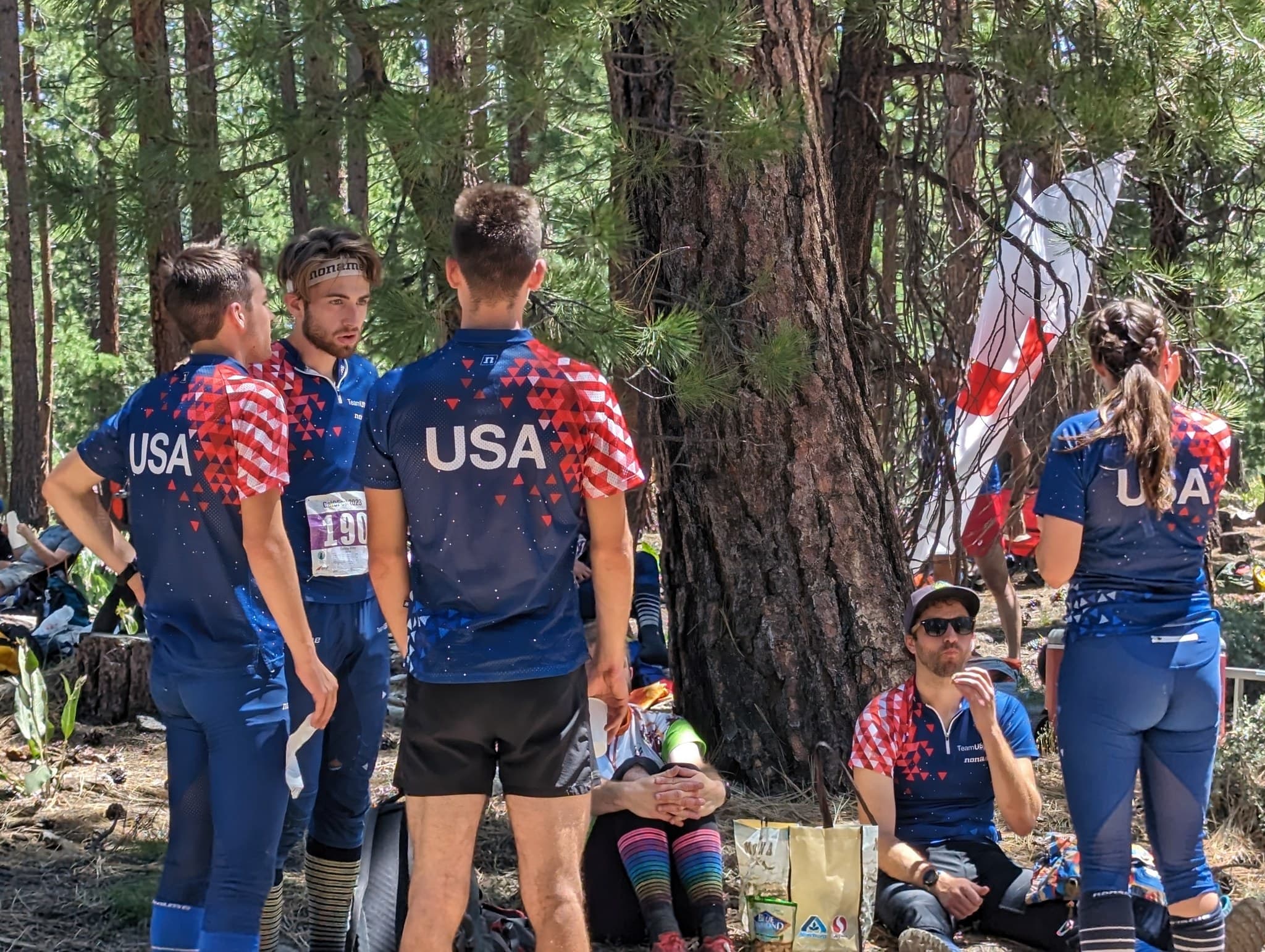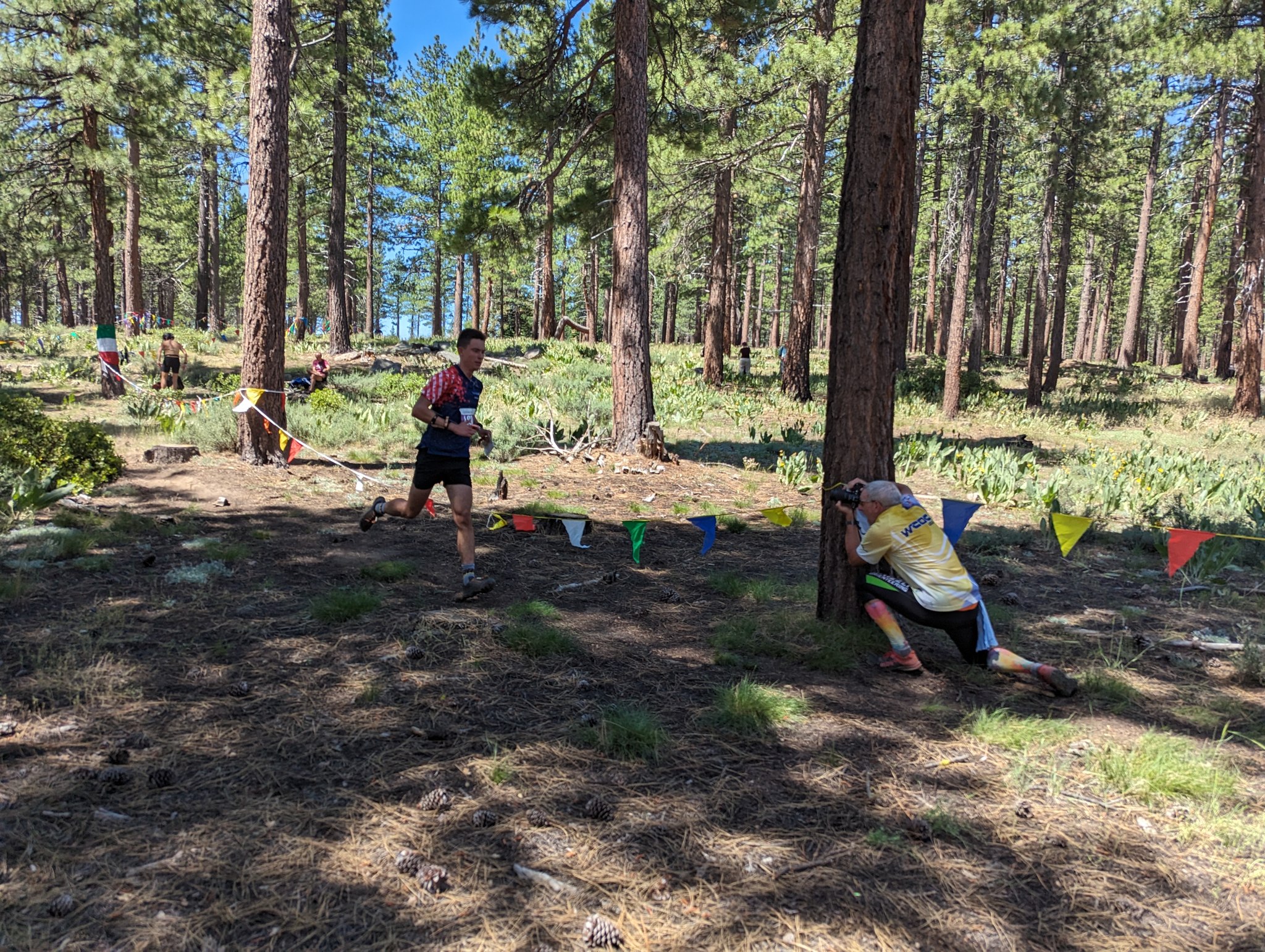
NAOC Recap and Reflection
This years North American Orienteering Championships (NAOC) 2023 was hosted by the Bay Area Orienteering Club (BAOC) in Lake Tahoe, CA.
These races were my primary goal for the year as I came off a pretty terrible 2022 season skipping the World University Championship races in Switzerland.

Recap
This was an extremely frustrating weekend of racing for me and really made me rethink how I'm approaching the sport of orienteering. Realistically, coming into these races I was probably the least prepared of all the competitive elite athletes in the field which is why, in hindsight, I'm not too surprised by the results. In the moment thought it was difficult to cope with such terrible performance both physically and technically.
Sprint
The sprint was definitely my worst race and that was not totally unexpected. I've faired well in sprints before, but typically that's when the navigation is straightforward and I just have been in good shape and executed well.
Erin Schirm set the courses at Northstar Resort and I must say that I was extremely suprised by the technicality he managed to achieve for a North American sprint.
I was completely unprepared for the number of fast decisions that were needed to be made, and also was not ready to read the artificial barriers on the map which I struggled to fully comprehend.
Many controls I would plan a route and get stuck behind a barrier that I did not see on the route. I also found myself without a plan coming into a checkpoint which forced me to slow down my pace, yet I'd still fail to choose a good route.
Midway through the course I also got hyper focused on the barriers and missed major route choices through the buildings (a common mistake made by some others as well).
Then once I finished I figured that some other people must have struggled nearly as much as I did, however I came in 11th place, extremely far back from the leaders. Then, after subtracting the large number of errors I realized I would still be far behind which did not offer much confidence in my physical abilities for the upcoming races.
Middle
Once again, I don't think I was well prepared for the extreme technicality of this race. The course was set in a different part of Little Truckee Summit when compared to last year's course which I found technically much more straightforward.
I had good speed in the beginning with a strong start toward the second control, however quickly ended up losing contact with the map and failed to recognize that I was doing so. I ended up too low and too short from the control, thankfully I hit control 6 and managed to relocate from there without losing much time.
However, screwing up the second control really affected my mentality the rest of the course -- I felt like I needed to push more aggressively to make up time which just ended up with more and more errors including a disasterous 4 minute mistake on control 7 where Danny caught me and I totally botched my compass bearing.
The ending of the course went decently well. I managed to gain a decent amount of time on Danny and almost regained the entire 4 minute interval in which he gained on me. However at the end of the day I placed 11th again, behind the same group of competitive elites.
Afterwards I wasn't as surprised by this result as compared to the sprint, I knew I had a pretty terrible race and that I could've done much better. The Americans overall faired pretty poorly in this race with Canada sweeping the podium.
I ended the course with pretty bad blisters on my heel which would affect my result in the Long and cause a terrible ending to the already disaster of a weekend.
If I took anything away from the Middle it was that I was totally unprepared for any kind of technical orienteering. At Westpoint a few months previously I performed decently well because it's terrain that I'm comfortable with: detailed contours and rock features which make it easy to maintain map contact. At Tahoe, the terrain was extremely vague hillsides with few rocks features that were hard to differentiate. I severely lacked any training in this area for a long time and would have needed more practice in this type of terrain if I had any hopes of being able to take the aggressive orienteering posture that I was aiming for.
Long
I said the sprint was my worst race, but I think the long actually takes the cake here.
After the middle I knew that I had to focus more on avoiding mistakes and prioritizing accurate navigation. Yet, I blew over 4 minutes on the first two checkpoints of the course. Once again, this set off a pretty negative mentality especially after the two previous races, however I felt like I managed to reel it in after a couple of clean controls after that.
Despite my positive outlook on the remainder of the course, my speed was not super high and my navigation was still extremely sloppy with small mistakes made on control 5 and 7.
When I reached control 8, there was a pain developing in my IT band as I've been dealing with a bout of ITBS over the course of the last month or so. At the same time I was dealing with quite a bit of pain from yesterday's blisters which were just getting worse after each control.
Then, as the symptoms got worse I decided to quit right after reaching control 9. I really don't like the idea of quitting, but certainly made the right decision given the circumstances. I had to walk back 6 kilometers in barefeet just to manage the pain from the blisters. This caused seriously bruising and bleeding of my feet which would once again affect the following days.
Relay
I did not compete due to blisters which I decided needed to fully heal. I tried a variety of solutions to deal with the blisters like compeet bandages, athletic tape etc. but it just happend to be that the shoes I was running in were far too prone to developing heel blisters that I couldn't really race.
In hindsight, if I had run in my sneakers instead of my orienteering shoes I could probably have completed the course, but I still think I made the right decision to let the blisters heal an extra day so I was able to run the races later in the week.

Reflection
That was absolutely terrible and frustrating, but I also realized that I could channel the frustration to allow myself to rethink my priorities when it comes to orienteering.
Like I already mentioned, I was the least prepared competitive athlete in my category this year. So the fact that I performed the worst out of everybody is not so much a surprise, in fact I should've been more surprised if I had performed well compared to everyone else.
The Canadian Team had a training weekend beforehand which allowed them to prepare for the terrain and adapt to altitude. Many of the American orienteers had already competed previously during the summer at WOC or otherwise had done a number of orienteering events or specific preparations. Meanwhile I was struggling with ITBS and not doing any orienteering training besides a single day in Tahoe.
I realized that if I want to achieve my goals of becoming a much stronger orienteer and be competitive in the international scene that I need to reevaluate how I'm able to prepare and train for such a possibility.
Studying at Stanford is an amazing opportunity for my future and also just has been a blessing in terms of the friend and connections I've made there. However, it is the worst possible place to be in terms of quality orienteering training and preparing myself for competitions.
Although I've "graduated" this year, I'm officially done with my degree next Spring. I've considered for a long time the idea of moving abroad for a couple of years to a country like Sweden or England and joining a local orienteering club. I'm still considering this option, although what I've found is that to live in a European country without a job or university sponsorship is impossible. Thus, I've been applying to a number of jobs with the knowledge that getting an entry-level position at a foreign company straight out of college is extremely difficult.
Another options that I'm seriously considering is moving to Scranton after college. Greg Ahlswede has been set up there for a long time and has mapped many local areas within driving distance that are relevant to technical orienteering terrain. Also, being situated in the Northeast there are plenty more national meets and local meets that are of high quality than in the Bay Area.
Also, having multiple orienteers (Greg and I, but possible more) in the same area would allow for something that I think Greg has been missing in his training out in Scranton -- the ability to work together to have more optimal sessions. Whether that means just reviewing courses together afterwards, or even pushing each other in mass start and interval trainings to really build up the speed and confidence with orienteering.
The job market in Scranton is tough and I've been looking for remote entry-level software positions such that I can work from Scranton at a company that compensates fairly well. So that's another options I'm considering.
Either way, I realize that after college I want to prioritize putting myself in a position where I can train and race orienteering much more than I am now that I'm in school.